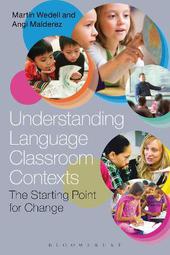
|
Understanding Language Classroom Contexts: The Starting Point for Change
Hardback
Main Details
| Title |
Understanding Language Classroom Contexts: The Starting Point for Change
|
| Authors and Contributors |
By (author) Dr Martin Wedell
|
|
By (author) Angi Malderez
|
| Physical Properties |
| Format:Hardback | | Pages:248 | | Dimensions(mm): Height 234,Width 156 |
|
| ISBN/Barcode |
9781441198372
|
| Classifications | Dewey:407.1 |
|---|
| Audience | | Tertiary Education (US: College) | | Professional & Vocational | |
|---|
| Illustrations |
40
|
|
Publishing Details |
| Publisher |
Bloomsbury Publishing Plc
|
| Imprint |
Bloomsbury Academic USA
|
| Publication Date |
11 April 2013 |
| Publication Country |
United States
|
Description
Arguably the whole point of education is to effect change in what people know and are able to do. Globalization has contributed to a common perception worldwide of the need to introduce changes to the teaching and learning of languages. The success of many attempts to do so has been limited by insufficient consideration of implementation contexts. Understanding Language Classroom Contexts explores and illustrates how what happens in any (language) classroom is influenced by (and can be an influence on) the contexts in which it is situated. A clear understanding of these influences is thus the starting point for planning effective change. The book considers many visible and invisible features of the multiple layers of any context, and provides a framework for understanding the types of factors that may influence whether changes (planned by a teacher or externally initiated) are likely to be successful. The book will help teachers (and educational managers or change planners outside the classroom) to understand why their classrooms are as they are and so to make informed decisions about what can or cannot (or not easily) be changed, and suggests how any changes might be appropriately managed.
Author Biography
Angi Malderez is a freelance education consultant, and Honorary Senior Fellow of the School of Education, University of Leeds, UK. Martin Wedell is Senior Lecturer and Head of International Education at the University of Leeds, UK.
ReviewsThis volume discusses the subtle interconnectedness of the language classroom and change. By means of thought-provoking questions and tasks, the authors repeatedly turn their monologue into a dialogue with the readers to help them understand that they are not only the products but also the creators of their classroom contexts. While specifically directed at teachers of English, this book is an eye-opener for anyone who has a stake in education. And who doesn't? * Peter Medgyes, Professor of Applied Linguistics, Eoetvoes Lorand University of Budapest, Hungary * What I like most about this book is that the authors have managed to facilitate readers in understanding the complex and dynamic nature of language classroom contexts by incorporating their own processes of analyzing a large amount of real data. In this way, not only do they ease our journey of exploring culture, but they also give us a fantastic practical tool for our own research analysis. * Qiang Wang, Professor of Applied Linguistics and English Teacher Education, Beijing Normal University, China * I have found this book illuminating as it is exciting in exploring and foregrounding the contextual issues that teachers of English Language and, indeed all language teachers as well as school leadership practitioners grapple with in their efforts to provide a conducive environment for learners. It is easy to identify with, extremely educative and the style used is both 'soft' and friendly to the reader. The book inspires the reader to reflect more on the dynamics and the multiple layers of socio-cultural contexts in schools thus raising the inquisitiveness of the readers on the relevance of adopting universal conceptualisations of language teaching and school leadership in a fast changing world. * Julius O. Jwan, Senior Lecturer in Educational Leadership and Management, Moi University, Kenya * Some notion of context underlies almost every kind of thinking or discussion in language education, especially English language education (ELE). The term 'context' has by now acquired such connotations in ELE that it is no more possible to give any adequate equivalent to it. But while it is widely acknowledged that any aspect of ELE has intricate links with 'context', there hasn't been any comprehensive exploration of context per se.It is, therefore, a matter of great significance that at last here is a book that takes up 'context' in its own right and deals exclusively with it. This is an excellent resource for everyone - from practicing teachers to administrators and policy makers - and absolutely essential reading if you are involved in change. The most important strength of the book is that it attempts to compile 'the whole picture' of context from many perspectives - historical and descriptive, macro and micro, insider and outsider, and practical and theoretical. Another key strength is numerous tasks, thinking questions and authentic illustrations which constantly remind and help readers to situate the discussion in their own contexts. If you are looking for a good grounding in 'context', this is the book to begin with! * Amol Padwad, Associate Professor and Head of the Department of English, J. M. Patel College, Bhandara, India * The book has a user-friendly, approachable design and is very readable . . . the authors' survey of the available literature is excellent . . . I know I shall be referring to Understanding Language Classroom Contexts in the months and years to come, whether for my own interest, for training purposes, or for reminders of questions and models to bear in mind when involved in change projects. -- Sue Leather * ELT Journal * The authors do a service to the field by beginning a thorough investigation into the meaning of context. -- Daniela Torre * Teachers College Record *
|